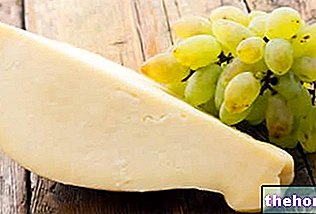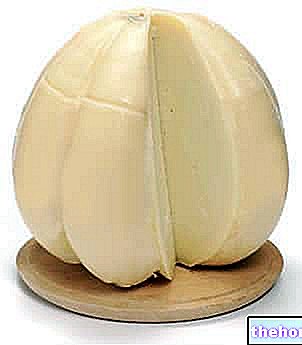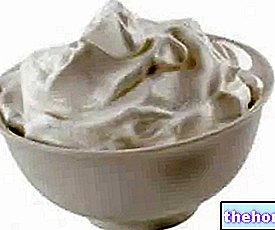Types of vegetable milks and role in the diet
Vegetable milks are competitive foods of cow's milk; these are totally different products compared to the emunctory fruit of the breast, however, vegetable milks find a fairly widespread consumption among those who, for physical reasons (intolerances or allergies) or philosophical (for example veganism), do not consume animal milk.
The most common and consumed vegetable milks are:
- Soy milk »Video Recipe to make it at home
- Rice milk »Video Recipe to make it at home
- Almond milk »Video Recipe to make it at home
- Oat milk »Video Recipe to make it at home
- Coconut milk »Video Recipe to make it at home
- Amaranth milk »Video Recipe to make it at home
- Hazelnut milk »Video Recipe to make it at home

Indications
Recalling again that (in a balanced diet) cow's milk DOES NOT NEED to be replaced with vegetable milks, which are instead chosen for their pleasantness (subjective) or for ideological reasons; having said this, it should also be remembered that the choice of an alternative product could also be partially justified by one or more pathological or paraphysiological conditions; the most frequent are:
- Lactose intolerance
- Allergy to cow's milk proteins
- Hypercholesterolemia
In fact, vegetable milks DO NOT contain lactose, DO NOT contain cow's milk proteins and DO NOT contain cholesterol; however, that doesn't mean they are hypoallergenic foods! In fact, that to soy proteins is one of the most common allergies, and in any case there is no lack of problems towards almonds or oats (less frequent those towards rice).
Nutritional peculiarities
Let's start by specifying that, in the absence of pathologies, IT DOES NOT MATTER if vegetable milks bring unsaturated fats and are free of cholesterol and lactose; moreover, even in a cholesterol-lowering therapy or in the treatment of lactose intolerant it is possible to insert cow's milk managing (if necessary) the level of skimming or preferring a highly digestible milk (delactosed milk). The same cannot be said for those allergic to milk proteins who should choose TOTALLY hydrolyzed animal milks (in which ONLY amino acids and NOT peptide chains are present); but this, in my opinion, would be a "useless forcing.
However, let us mention the "exclusive" composition of vegetable milks; for example, in soy milk there are some very useful cholesterol-lowering nutritional molecules, lecithins. It is therefore deductible that consuming soy milk instead of cow's milk could benefit from its cholesterol-lowering "optimization" (but the same cannot be said of rice or almond milk); however, soy is not the only legume to contain lecithin, therefore consuming other similar products could confer the same nutritional advantage without necessarily having to choose a plant milk.
An "other nutritional component strongly present in soy milk, and less in cow's milk, is constituted by the essential omega-3 fatty acids. Finally, in my opinion, the fibrous component dissolved in vegetable milks is very unnecessary; in fact, modest quantities of dietary fiber which (obviously) is not found in cow's milk However, it is certainly not the fiber contained in vegetable milks that significantly contributes to the achievement of the "famous" 30g / day.
NB. ALL vegetable milks, to vaguely resemble cow's milk, must be supplemented with some nutrient. The nutritional principles (micronutrients) deficient by definition are Calcium, vitamin D and vitamin B12, while from a macronutritional point of view there is an addition of sucrose or glucose in almond milk, but also sunflower oil in oat milk and in milk. of rice.
Having said that, wanting to make a nutritional comparison of the products listed above, I would omit to mention mineral salts and vitamins as, through fortification (integration of vegetable milks with vitamins and minerals), they can reach (more or less) the same concentrations of cow's milk. ; on the contrary, the macromolecules can be significantly different from each other, and the nutritional comparison between vegetable milks and cow's milk could reveal the appropriateness or otherwise of a drink with respect to the others.
Comparison between vegetable milks and cow's milk
(the highest values in red and the lowest in green)
Milk, Dairy Products and Cheeses Asiago Brie Burrata Caciocavallo Rennet Camembert Cheddar Milk Cream Crescenza Emmental Feta Milk Flakes Fontina Herbal Cheeses Lean Cheeses Cheeses rich in calcium Gorgonzola Gouda Grana Padano Gruyere Kéfalair Adapted milk Artificial milk Condensed milk Asphyxiated milk Goat's milk Sheep's milk Rice milk Soy milk Powdered milk and concentrated milk Skimmed and semi-skimmed milk Lactose-free milk Milk Vegetable milk Dairy products Lerdammer Mascarpone Montasio Buffalo mozzarella Mozzarella Whipped cream Cooking cream Fresh cream Parmigiano Reggiano Pecorino Philadelphia Primo Sale Provolone Ricotta Robiola Roquefort Scamorza Sottilette Squacquerone Taleggio Tomino Yogurt OTHER ARTICLES MILK AND DERIVATIVES Categories Alcoholic foods Meat Cereals and derivatives Sweeteners Sweets Offal Fruit Dried fruit Milk and derivatives Legumes Oils and fats Fish and fishery products Cold cuts S pezie Vegetables Health recipes Appetizers Bread, Pizza and Brioche First courses Second courses Vegetables and Salads Sweets and Desserts Ice creams and sorbets Syrups, liqueurs and grappa Basic preparations ---- In the kitchen with leftovers Carnival recipes Christmas recipes Light diet recipes Women's Day, Mum, Dad Recipes Functional Recipes International Recipes Easter Recipes Recipes for Celiacs Recipes for Diabetics Recipes for Holidays Recipes for Valentine's Day Recipes for Vegetarians Protein Recipes Regional Recipes Vegan Recipes




























